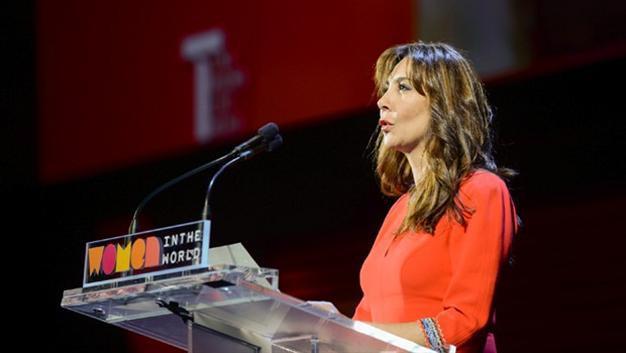Women and the media play a huge role in the process of reaching true freedom and peace, daily Hürriyet Chairwoman Vuslat Doğan Sabancı has told the audience at the gala dinner for the Women in the World (WITW) Summit in New York.
“True freedom is not only about the right to say whatever you want to say. It is also about the right to be heard, acknowledged and recognized,” Doğan Sabancı said in her speech on April 6, addressing some 2,500 people, most of whom were women.
“True freedom is not an entirely individualistic right. It is a collective right that all sides are accountable for,” she added.
WITW, which launched in 2009 as an offshoot of the U.S.-based online news outlet “Daily Beast,” is an initiative which aims to gather heroic women leaders whose success stories can enlighten a large array of international issues. Through the annual summits, the world’s most influential women have conveyed their experiences and stories on a vivid and inclusive platform.
Doğan Sabancı said in her speech that true freedom was “a dialogue, even better a conversation, but never a monologue.”
“It is not one voice only; it’s many voices creating a chorus,” she added.
“Women have a particular role in contributing to this space of true freedom,” Doğan Sabancı said.
“Through the gracefulness of our actions and the compassion of our intentions, we can initiate conversations where not only you and me but everybody feels acknowledged and free.”
Highlighting that the Doğan family has been committed to freedom of expression even under the most difficult times for 40 years, Doğan Sabancı said an essential part of the media’s job was to provide the audience with opposing views and discussions.
“Either we can serve as a channel of hatred and fear, or we can serve as a voice of wisdom and reason. Choosing between the two will have important consequences on the freedom, peace and harmony of our world,” she said.
The “ever growing divides on race, ethnicity, politics and religion” was a common enemy of the world, along with terrorism, the Hürriyet chairwoman said, adding that Islamophobia, “a contagious decease that is taking over even the most responsible and reasonable minds,” was one of the results of the segregating rhetoric which needed to be handled with care.
Highlighting the importance of communication in the quest to overcome differences, Doğan Sabancı gave her grandmother as an example.
“My grandmother, Meliha Kantek, was an extraordinary woman,” she said.
“Born in 1920, she was one of the first Turkish feminists who committed herself to women’s rights. By all definitions, she was a follower of [Mustafa Kemal] Atatürk. She embraced the progressive reforms of the young republic.
“But she was also a strong believer in her faith and stayed well-rooted in the traditions of Islam and practiced the tenants of our religion regularly.”
The two such identities may often have conflicting values, Doğan Sabancı said, and the secret to embracing them both was communication.
“Grandma was a brave woman who did not shy away from expressing even her most provocative thought,” she said.
“However, she chose kind and respectful words that did not hurt or scare anyone. On the contrary, her playful words invited people to engage in conversations.
“She was also a compassionate listener. This stimulated people to open up their hearts and talk about their truths. Through her wisdom of communication with those around her, she reconciled many different identities and opinions as well as for the ordinary ones.”
Doğan Sabancı also underlined the problems of handicapped people in Turkey in the “The woman I’m here For” section of the summit, which gives participants a chance to read a first-person account of an inspiring woman that they would like to “give a voice” to on stage. The women Doğan Sabancı “gave a voice” to was theater actress Gamze Elibol.
 Women and the media play a huge role in the process of reaching true freedom and peace, daily Hürriyet Chairwoman Vuslat Doğan Sabancı has told the audience at the gala dinner for the Women in the World (WITW) Summit in New York.
Women and the media play a huge role in the process of reaching true freedom and peace, daily Hürriyet Chairwoman Vuslat Doğan Sabancı has told the audience at the gala dinner for the Women in the World (WITW) Summit in New York.